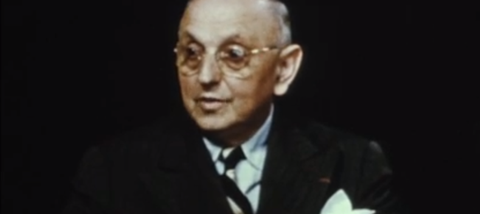
Dietrich Bonhoeffer called him naïve.
Reinhold Niebhur (he of the "grant me the serenity to accept the things I cannot change, the courage to change the things I can and the wisdom to know the difference" prayer) basically called him a Nazi sympathiser.
But to everyone involved in the making of this one-hour documentary, Frank Buchman was something between Gandhi, Mother Teresa and Stephen Hawking.
They, and the film, seem utterly convinced of his greatness. Every interviewee in The Man Who Built Peace asserts something of the genius of Buchman’s thinking, its historical significance and its relevance today. But what they make up for in slightly cultish enthusiasm, they lack in actual argument.
This is a film that has started with a conclusion and failed to work all the way backwards to the evidence. And watching it is, if one has no personal memory of the probably great work of the Oxford Group and Moral Re-Armament (MRA), akin to watching a likeable nephew play football and wanting him to play well – and being disappointed, not angry.
Frank Buchman, judging by this nicely put-together documentary of archive footage and interviews with a couple of academics and a handful of people who either knew the man or were part of his movement, was an excellent evangelist and a better networker.
Cosying up to Hitler and Himmler in the 1930s in the name of preventing war is an object lesson for pacifists today
He also seems to have been driven by good motives: peace, reconciliation, purity and truth. All the good stuff, little of the bad you get in men who head up Christian movements with global ambitions. And the influence of both the Oxford Movement and MRA has been impressive. Out of them sprang Alcoholics Anonymous – and by extension the whole 12 Step movement that has freed so many people from addiction through an emphasis on personal responsibility and accountability (as well as reliance on a “Higher Power”).
They also helped to popularise the idea of the Quiet Time, so long a staple discipline of the evangelical.
But it’s Buchman’s other, more ambitious attempts at influence that bring us back to Bonhoeffer and Nibhur and the charge of naivety. Yes, Moral Re-Armament’s desire to see an end to war and a promotion of reconciliation between people scarred by war and oppression, through the Christian disciplines of forgiveness and confession, is to be applauded.
But cosying up to Hitler and Himmler in the 1930s in the name of preventing war is an object lesson for pacifists today in what our (and I mostly count myself among the peaceniks, so it is ‘our’) movement can look like and be, without sufficient rigour.
It’s not so much that Buchman actually praised Hitler – many 20th Century Christians duped by the rhetoric and idolatry of capitalism held similar unfortunate views as part of their hysterical fear of Communism. It’s more the naivety which holds that peace is good at any price that should give the socially conscious Christians among us some pause to think.
When a nation is descending into a popular state of racial hatred, oppression and militarism (which the film takes pains to say Frank Buchman deplored), it is simply not good enough to talk about peace. The Holocaust could have happened without the Second World War. Peace without justice is not enough.
The naivety that holds that peace is good at any price should give the socially conscious Christians among us some pause to think
As it happens, Buchman managed to avert neither. I’m going to go out on a limb and say that’s not entirely down to him. But while he was decorated by the Germans, French and Japanese for his efforts at reconciliation after the Second World War, the other attempts at changing the world seem to have come to very little, in the long run. Maybe all of ours inevitably do. Nobody, I hope, will hold that against me when I’m gone. But nobody, I hope, will make a documentary about my life that asks repeatedly how history could have forgotten a man of such significance. The answer, in Buchman’s case, is simply that he probably wasn’t that significant. He walked and talked with Gandhi. But so did a lot of people. He could teach us a thing or two about not allowing our political leaders to tell us who to hate, yes, and he took theatre productions to India to apologise for colonialism. Which is all fine and good. But it’s hardly reparations.
The fact is, when you read up further about Buchman, there are many things that point to his significance and the impact of his work and witness. It’s just unfortunate that this crowd-funded and slightly dubiously ‘award-winning’ documentary doesn’t make more of it. The assertion keeps on cropping up, particularly towards the conclusion of this film of conclusions, that his message and methods are more needed now than ever. But what are they? Perhaps another film can tell us more and lead us to the light.
The Man Who Built Peace: The Frank Buchman StoryDVD is out now. Click here for details about the London premiere
Click here for a free sample copy of Premier Christianity magazine



























